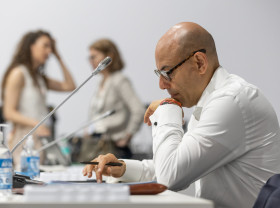UN Climate Change News, 3 July 2025 – As part of broader efforts to strengthen ambitious climate action in Latin America and the Caribbean, the Dominican Republic has made significant progress on the technical design of a pilot Emissions Trading System (ETS), with support from UN Climate Change's Regional Collaboration Centre (RCC) Caribbean.
This milestone positions the country as a regional leader in developing carbon pricing instruments aligned with the goals of the Paris Agreement.
The technical design report is part of the Collaborative Instruments for Ambitious Climate Action (CiACA) initiative, led by UN Climate Change and funded by the Government of Germany. CiACA supports countries in adopting carbon pricing instruments such as emissions trading systems to achieve their Nationally Determined Contributions (NDCs) and transition toward low-carbon economies.
A system tailored to the Dominican context
The pilot ETS design for the Dominican Republic is based on a comprehensive analysis of its national greenhouse gas (GHG) inventory and the sectors with the greatest mitigation potential. The initial proposal focuses on regulating two key sectors: electricity generation (energy sector) and clinker and cement production.
Between 2015 and 2050, emissions in these two sectors are projected to increase by up to 70% under a business-as-usual scenario without mitigation measures. This dynamic justifies their prioritisation in the pilot phase, in line with the Dominican Republic’s climate target of reducing emissions by 27% by 2030 compared to the projected scenario if current trends continue.
The design includes declining annual emissions caps over a five-year pilot period, free allocation of allowances during the pilot phase, and the possibility of meeting part of compliance obligations through certified offset projects, particularly in unregulated sectors such as agriculture, forestry, and waste. It also envisions a robust monitoring, reporting and verification (MRV) system to ensure environmental integrity and transparency.
Collaboration and capacity-building at the core of the pilot
The development of the pilot ETS has been made possible thanks to close collaboration among the Dominican Republic’s National Council for Climate Change and Clean Development Mechanism, the technical consulting team, and UN Climate Change and its RCC Caribbean. The process included both virtual and in-person consultations with key public and private sector stakeholders, as well as validation workshops to ensure local ownership and the feasibility of the proposed design.
This participatory, context-sensitive approach aims not only to help meet the country’s climate goals but also to strengthen institutional and technical capacities for managing carbon pricing instruments. It also lays the groundwork for future expansion, including regulation of additional sectors and potential linkage with international carbon markets.
Dominican Republic pioneers a regional experience in the Caribbean
The Dominican Republic’s case represents a valuable technical experience for other Caribbean countries interested in exploring carbon pricing instruments. The region faces similar challenges, such as high vulnerability to climate change impacts, reliance on imported fossil fuels, and the need for financing to enable the energy transition.
RCC Caribbean, based in Saint George’s, Grenada, will continue to facilitate technical cooperation and the exchange of best practices on carbon pricing instruments among Caribbean countries.
Looking ahead
The design of the Dominican Republic’s ETS is not only a step toward meeting its climate commitments and NDCs but also represents a strategic tool for advancing sustainable, low-carbon economic development. It also opens the door to new opportunities for climate finance, international carbon credit trade, and regional cooperation.
Through initiatives like CiACA and the work of UN Climate Change's RCC Caribbean, the region is strengthening its capacity to design and implement innovative climate policies that contribute to a low-carbon, just future for everyone.
Download the full report here (Spanish language only).
See the briefing note and brochure for more information (Spanish language only).
Learn more about the Regional Collaboration Centres here.
Dominican Republic Advances Design of Pilot Emissions Trading System
3 July 2025
Article




